How Much Lower Can EUR/USD, GBP/USD Go in Light of Powell’s Hawkish Remarks?
2023.09.22 08:16
- US dollar continues to strengthen on Fed’s hawkish stance
- EUR/USD could continue to head lower on the back of weak data from Eurozone
- Meanwhile, GBP/USD is now edging closer to support level at 1.22 following BoE surprise
The is on track to extend its winning streak for the 10th consecutive week, maintaining its robust outlook. This strength is bolstered by the persistent hawkish stance of the Fed after the to keep interest rates unchanged this month, as well as lackluster economic data emerging from Europe.
Following the latest Fed meeting, the central bank made it clear that they intend to keep interest rates elevated for an extended period. They also kept the door open for potential further rate hikes as part of their tightening policy, contingent on future economic data. These statements have resulted in an increase in US Treasury yields.
yields, for instance, surged to 5.31% after the interest rate decision, while the US Treasury yield climbed to 4.51%, marking its highest level in the past 16 years.
Furthermore, the lower-than-anticipated underscored the resilience of the economy. In contrast to these signs of weakness in other global regions, the demand for the US dollar remains strong, fueling the continued ascent of the DXY.
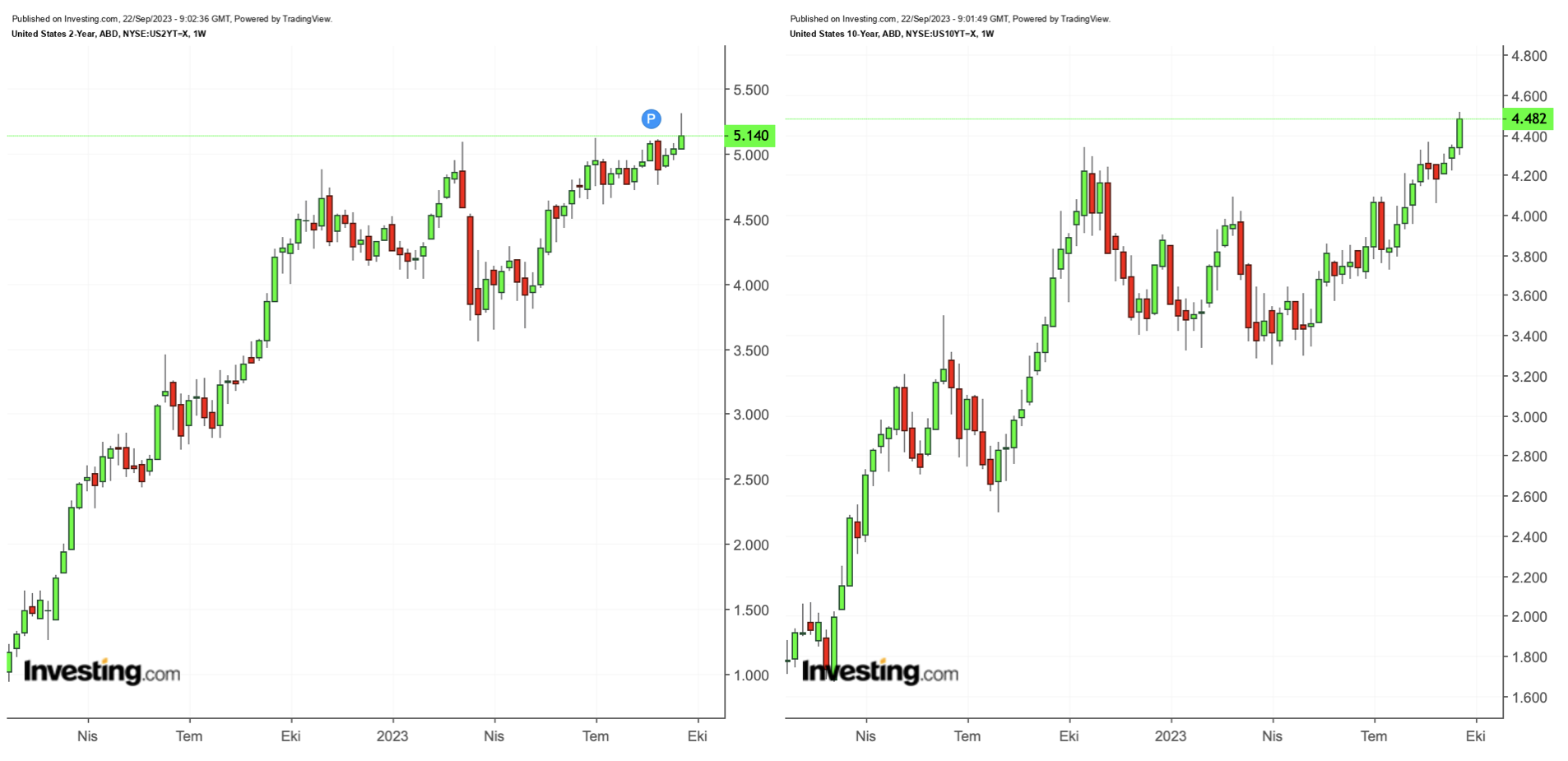 US 2-Year Vs. 10-Year Bonds
US 2-Year Vs. 10-Year Bonds
Technically speaking, after breaking out of the bearish channel in 2023 in September, the DXY rose to 105.78 this week and started to test the March peak.
In case of a weekly close above this region, it is likely to move towards the 106 – 108 band in the short term. This move would support the uptrend originating in July, subject to the condition that the lower peak formation is broken. For the next target zone, we can see that the 110 – 113 level may be on the agenda.
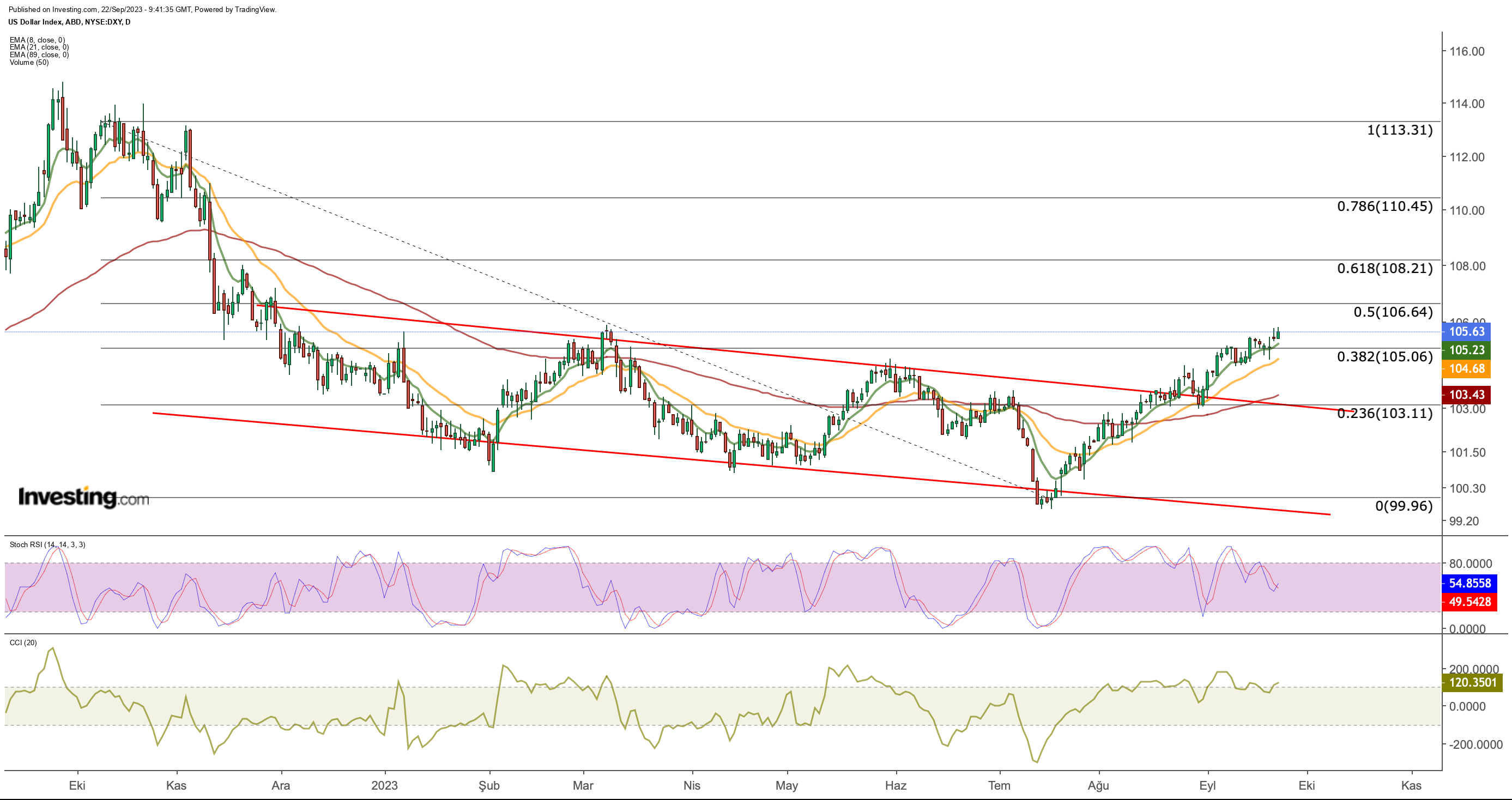
Short-term EMA values also have the ideal alignment to support the bullish outlook on the daily chart. On the other hand, the tendency of the Stochastic RSI for the DXY to turn up without going down to the oversold zone supports the strong outlook of the dollar.
In the lower region, the 105 – 105.2 level stands as the closest support for the DXY, while 104.6 and then 103.4 levels will be followed as other support points in a possible breakout.
EUR/USD Heads Lower Post Weak Economic Data
One of the factors that cause the dollar to maintain its strong course is seen as weak data from the Eurozone. Finally, PMI data from the Eurozone and the UK reflected the weakness in the economy.
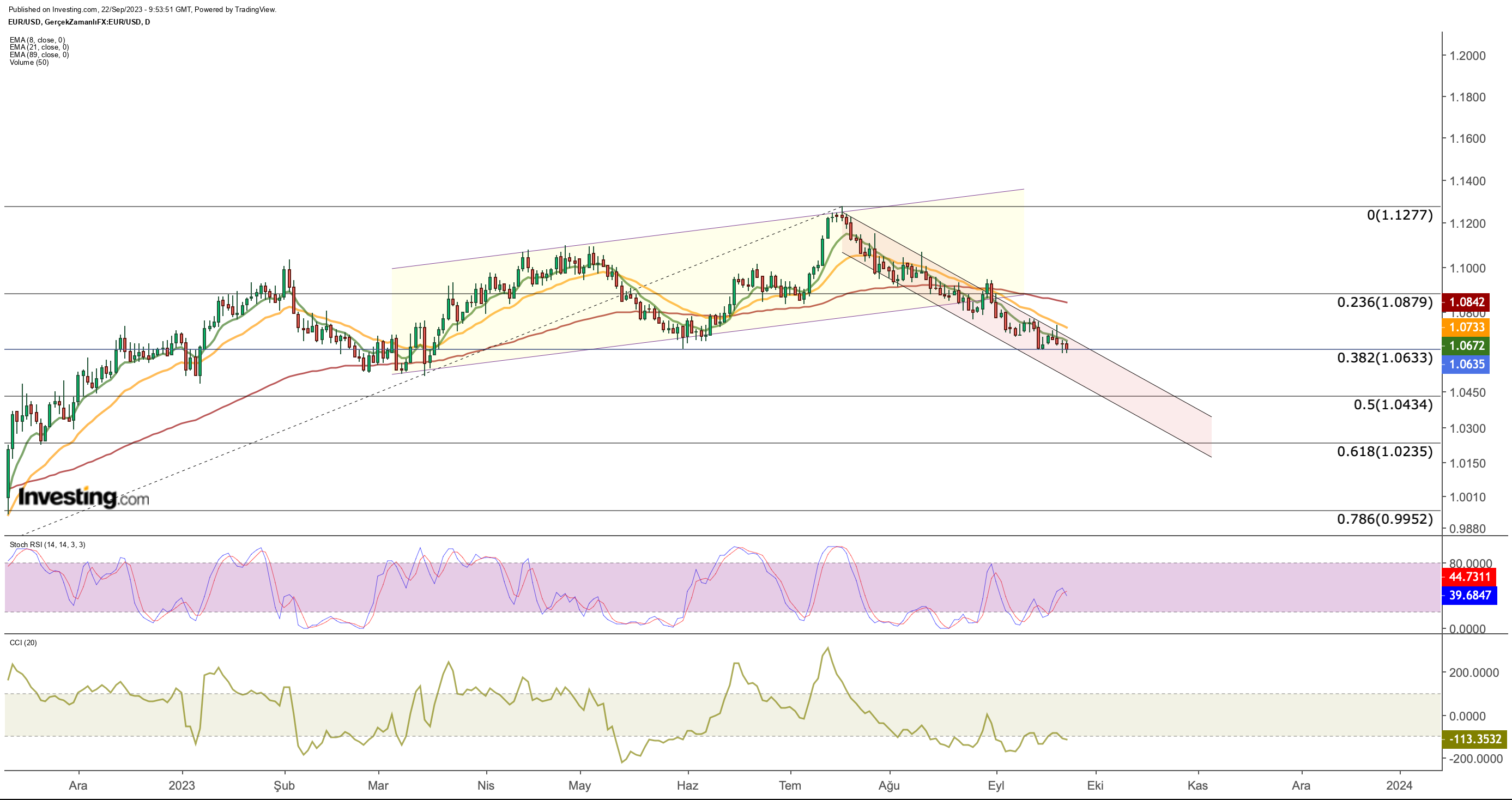
EUR/USD showed signs of a slight recovery at the beginning of the week as the data in Europe came in below expectations, and the reaction from the 1.0633 support led to the test of the 1.07 band. However, the pair, which turned down again after the Fed move, retreated back to the support level we follow at 1.0633 with the weak data coming today.
PMI data to be released by the US today will be closely monitored, and strong data may cause to close the week below the support level. In this case, we can see that the downward trend in the pair may continue within the falling channel continuing in a narrow band, first up to 1.05 and then to 1.04 support.
Today, the closest resistance for EUR/USD is observed as 1.0672, while the weak course of the Euro against the dollar will remain valid unless the second resistance level in the 1.073 region is passed just above it.
According to the current global environment, the most optimistic picture for EUR/USD seems to be consolidating in the range of 1.06 – 1.07 for the time being.
GBP/USD: BoE Rate Decision Keeps Pair Under Pressure, 1.22 Support in Focus
This week, while the interest rate decisions of the central banks shaped the foreign exchange markets, it was seen that the kept interest rates unchanged after the Fed.
The expectation for the UK rate decision was a 25 basis point hike, but the bank decided to keep the interest rate unchanged after the inflation data came in better than expected. The BoE stated that the tightening policy will continue similar to the Fed’s as long as the stubborn inflation outlook persists.
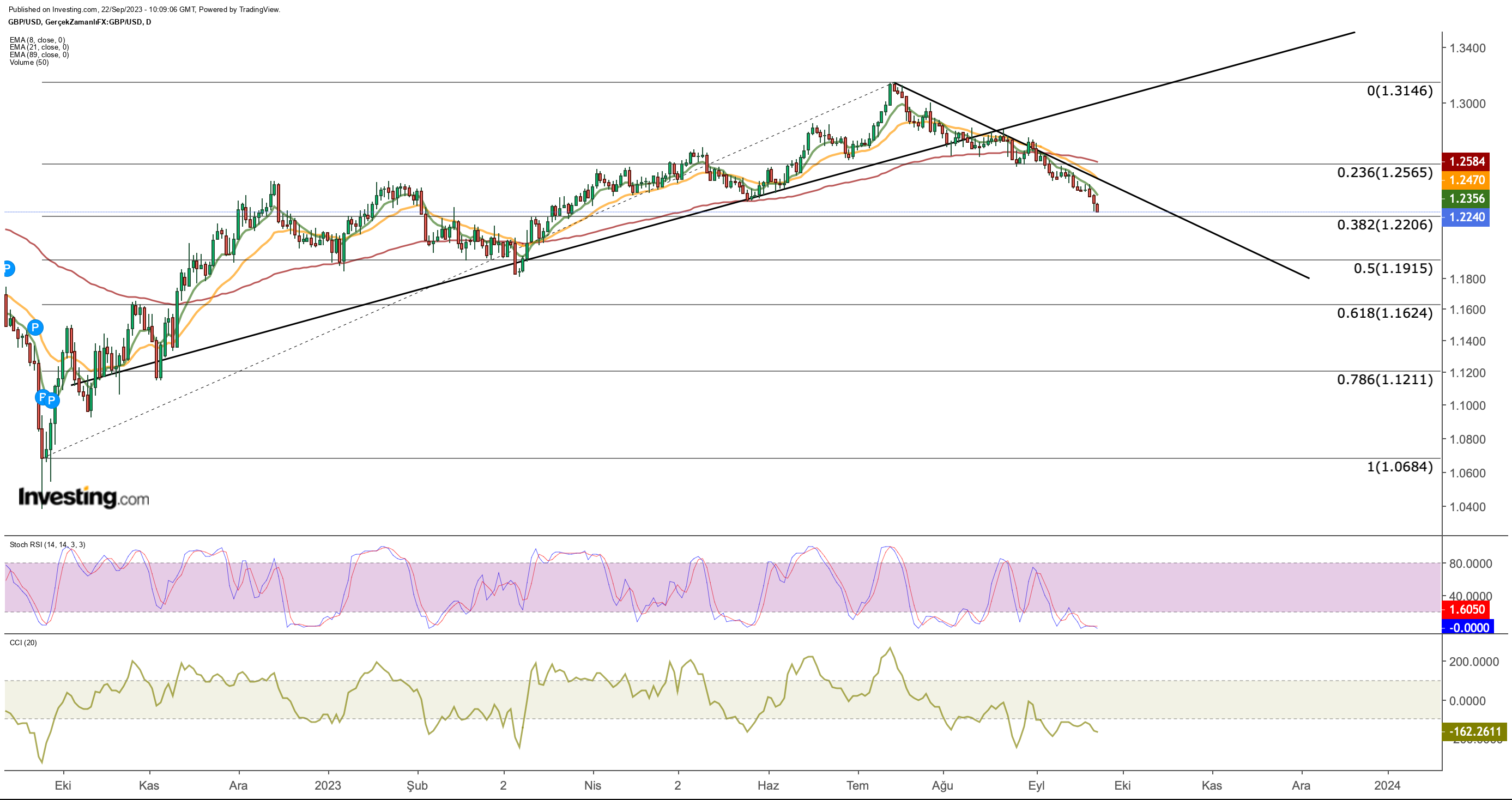
However, the fallout from this decision has had contrasting effects on different currencies. It bolstered the US dollar while causing a depreciation in the value of the . At the start of the week, GBP/USD struggled to maintain its position above the 1.237 mark, but as ongoing selling pressure persists, it is now edging closer to the support level at 1.22.
Should the pair fail to hold onto the 1.22 support, where the loss of momentum is accelerating, the next potential stop could be at 1.19. This region had previously served as a significant support area in the first quarter of the year. If the 1.22 support is breached, we might witness the pair trading within this range for a considerable period.
On the positive side, the immediate resistance for GBP/USD appears to be around the 1.236 level. A sustained move towards the 1.25 level could potentially provide the impetus needed to break the short-term downtrend. However, it’s important to note that the current outlook suggests a lower probability of an upward move at this time.
USD/JPY: Yen Faces Intervention Risk
Data released in Japan today showed that remained stable at 3.1% YoY. BoJ, which announced its after the release of the inflation data, kept the interest rate on hold while maintaining the loose monetary policy.
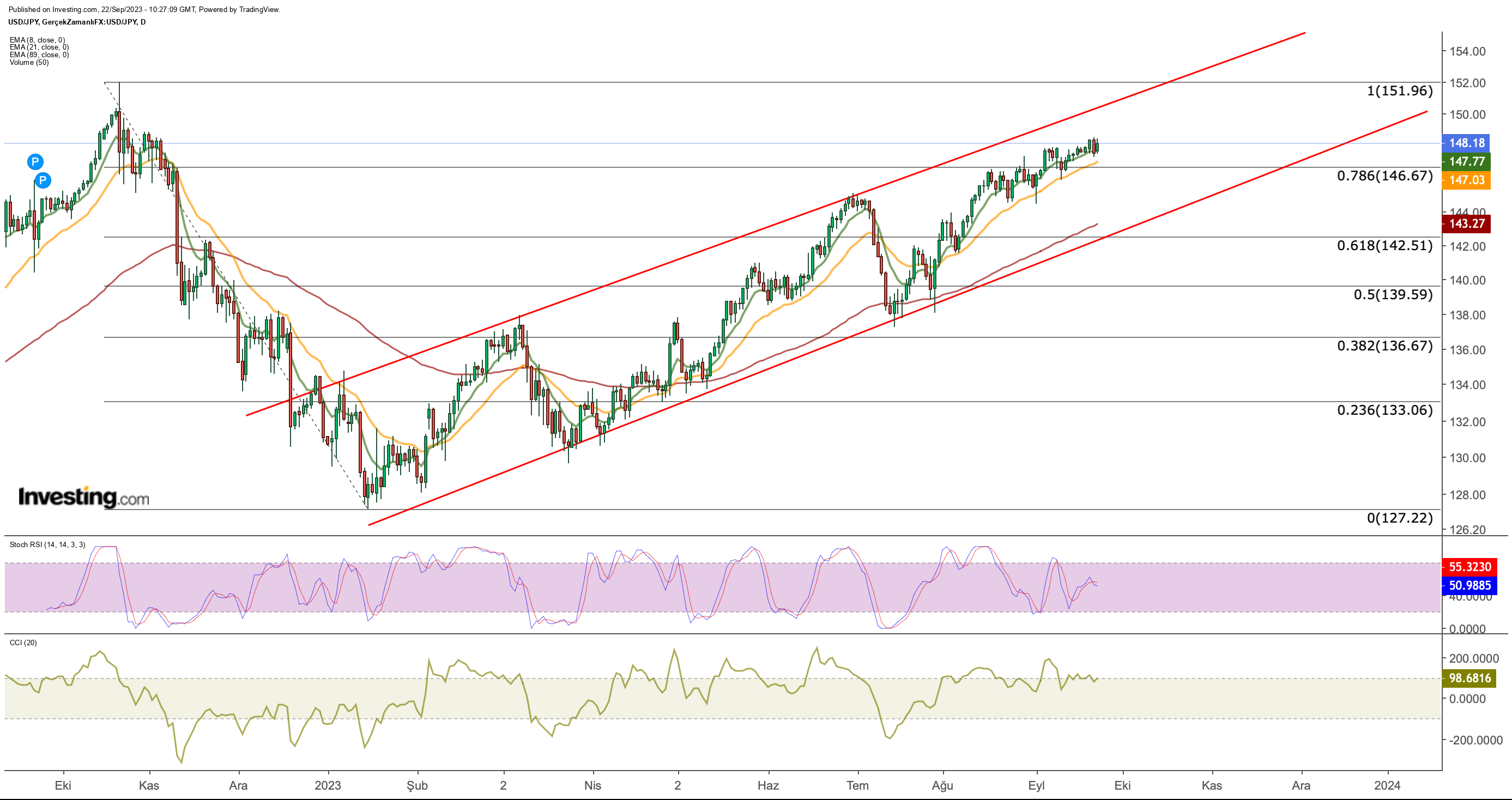
While other developed nations are firmly pursuing tight monetary policies, Japan’s approach remains expansionary, exerting continuous downward pressure on the yen.
In their post-decision statement regarding inflation, the Bank of Japan (BoJ) reiterated its unwavering commitment to support the economy until it achieves the coveted 2% inflation target. BoJ Governor Kazuo Ueda, while affirming that the current policy will persist until the inflation target is met, also indicated a willingness to adapt the monetary policy if there are indications that the target may be reached.
However, as continues its ascent, the market is contemplating the possibility of intervention. Some market participants argue that given the BoJ’s emphasis on price stability, the yen’s depreciation can be overlooked unless there is a notable increase in price volatility.
Nevertheless, there is a sense of caution in the market regarding potential yen intervention, especially as USD/JPY encounters resistance around the 148 mark this week. Throughout this month, the currency pair has struggled to breach the 147 level but finally entered the 148 range after this week’s pivotal decisions. According to the current outlook, momentum is expected to push toward the 150 level. Speculation circulates that this region might represent a threshold for potential BoJ intervention in the exchange rate.
On the downside, 147.7 serves as an interim support level for USD/JPY, with more robust support seen at the 146.6 level below this price point.
***

Find All the Info you Need on InvestingPro!
Disclaimer: This article is written for informational purposes only; it does not constitute a solicitation, offer, advice, counsel or recommendation to invest as such it is not intended to incentivize the purchase of assets in any way. As a reminder, any type of assets, is evaluated from multiple points of view and is highly risky and therefore, any investment decision and the associated risk remains with the investor. The author does not own the stocks mentioned in the analysis.








